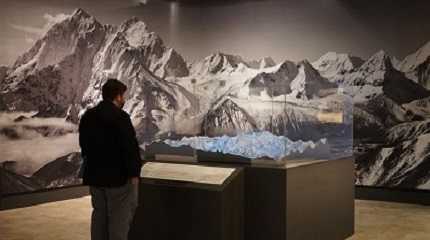
LOS ANGELES, May 20 (Xinhua) -- From the climbing rope found with the remains of British mountaineer George Mallory, who took part in the first British expeditions to Mount Everest in the early 1920s, to one of the first oxygen sets ever employed in high-altitude climbing, an exhibition being held in Bowers Museum in U.S. Southern California takes visitors on an epic journey to Mount Everest.
Titled "Everest: Ascent to Glory", the exhibition combines photographs, films and artifacts from five expeditions leading up to the earliest successful attempt to climb the highest mountain in the world in 1953.
"The exhibition focuses on the five expeditions to climb Mount Everest from 1921 to 1953," Peter C. Keller, president of Bowers Museum, told Xinhua.
"It consists of over 100 original photographs and some key pieces of equipment, including some very precious pieces that had been brought back from Tibet," he said.
Bowers Museum partners with The Royal Geographical Society in London to present the exhibition, showcasing the illustrious history of Mount Everest and changing technologies of the initial attempts to climb the mountain.
This exhibition, curated by renowned Canadian cultural anthropologist and author Wade Davis, comes just after the centennial of the first British reconnaissance expedition to Mount Everest in 1921.
The show, which runs through Aug. 28, attracts over 600 visitors everyday. The audiences are further immersed as they view a 3D model of the colossal mountain, called by native people as "Goddess Mother of the World".
"The exhibition has revealed the adventure spirit of human kind, and it inspires young people to work hard, persevere and overcome difficulties on their way to reach their goals," Anne Shih, chairwoman of the Board of Governors of Bowers Museum, told Xinhua.
Keller said the exhibition is partially a Chinese exhibition as half of Mount Everest is on the Tibetan side of China.
"The approach to Mount Everest is easier on the Chinese side than the Nepalese side," he said.
Bowers Museum, founded in 1932, has cooperation and exchange programs with Chinese museums including the Palace Museum, Nanjing Museum and Shanghai Museum.
It has hosted various exhibitions featuring cultural heritage in the Forbidden City, Tibet, Xinjiang, the Terra-Cotta Warriors in Shaanxi Province, and other parts of China.
"We are very energetic in cooperation with China," Shih told Xinhua, adding Bowers Museum is committed to serving as a bridge in U.S.-China cultural exchange.
"We hope to bring the Chinese culture to American audiences through various exhibitions, so that they can learn more about China's profound history and splendid culture," Shih said.




